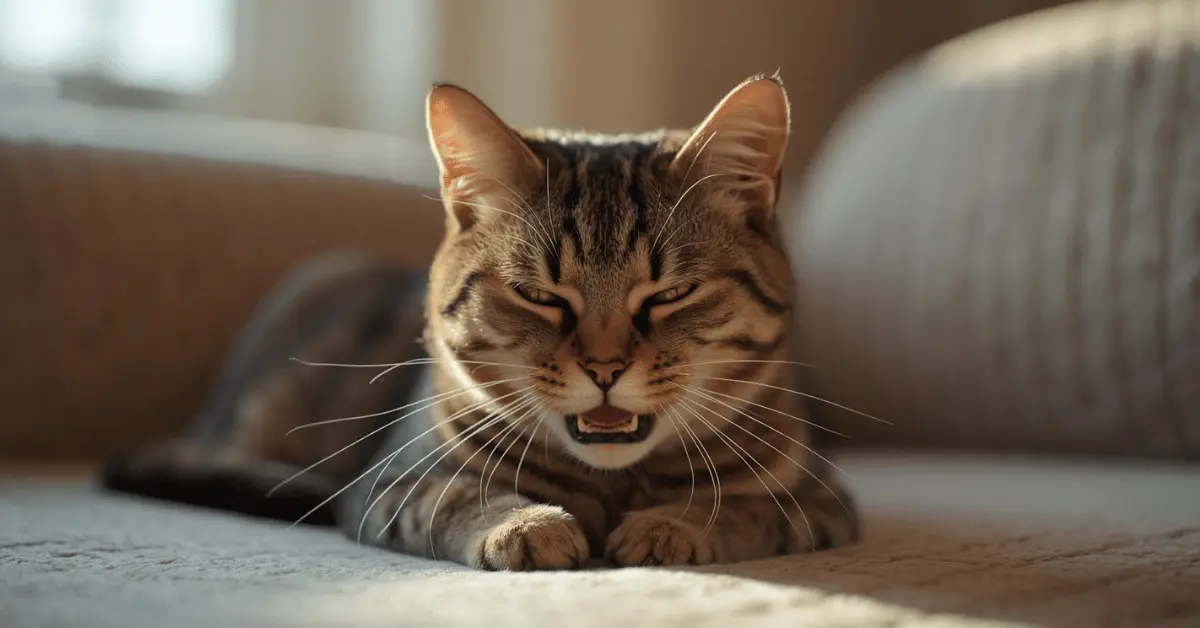Cats are known for their quirky behaviours—chasing shadows, kneading blankets, and curling up in the oddest places. But when your cat starts sneezing constantly, it’s hard not to worry. A sneeze here and there is usually nothing serious, but frequent sneezing can sometimes signal an underlying issue.
1. Everyday Environmental Irritants
Just like people, cats can sneeze in response to everyday irritants.
Common Household Triggers
Dust, pollen, smoke, perfumes, and even strong cleaning products can all cause a tickle in your cat’s nose. Some cats are especially sensitive to scented cat litter, which can make them sneeze after every trip to the litter box.
How to Reduce Sneezing from Irritants
- Switch to unscented litter to avoid unnecessary irritation.
- Avoid spraying air fresheners or strong cleaning chemicals near your cat’s spaces.
- Keep your home well-ventilated and dust-free.
Most of the time, if environmental factors are the culprit, sneezing will be occasional and won’t come with other symptoms like discharge or lethargy.
2. Upper Respiratory Infections (URIs)
One of the most common reasons cats sneeze frequently is an upper respiratory infection.
Viral and Bacterial Causes
These infections are similar to the common cold in humans and are usually caused by viruses like feline herpesvirus (FHV-1) or feline calicivirus. Bacterial infections, such as Bordetella or Chlamydophila, can also play a role. Cats in multi-cat homes, shelters, or unvaccinated cats are especially vulnerable.
Symptoms Beyond Sneezing
- Eye discharge (watery or crusty)
- Nasal discharge (clear, yellow, or green)
- Lethargy and fever
- Reduced appetite or dehydration
If your cat shows these signs, it’s important to schedule a vet visit. While some mild infections clear up on their own, others require medication or supportive care. BluePearl Vet provides excellent resources on recognizing and treating feline respiratory infections.
3. Allergies and Chronic Rhinitis
Although allergies are less common in cats than in humans, they can still be a reason for persistent sneezing.
Seasonal or Year-Round Allergies
Cats can react to pollen, mold, dust mites, or even certain foods. Allergic reactions may cause sneezing, watery eyes, and sometimes coughing. If symptoms seem to flare up during certain seasons, allergies may be the culprit.
When Sneezing Becomes Chronic
In some cats, chronic inflammation of the nasal passages—known as chronic rhinitis—leads to ongoing sneezing, congestion, and nasal discharge. Treatment may involve medication to reduce inflammation or manage underlying causes.
Related Posts
- Can Cats Eat Rose Petals? Safety Facts for Pet Parents
- How Long Can a Cat Go Without Eating or Drinking?
- 10 Warning Signs of Cat Poisoning Every Owner Should Watch For
- 7 Signs Your Cat Has a Sensitive Stomach: What Every Cat Owner Should Know
4. Foreign Objects in the Nose
Cats are curious creatures, and sometimes that curiosity leads them to inhale or sniff up small objects.
Common Obstructions
Blades of grass, bits of litter, or tiny household debris can get lodged in the nasal passages. This often results in forceful, repeated sneezing, sometimes with blood.
Signs of a Foreign Body
- Sudden onset of sneezing fits
- Pawing at the face or nose
- Bloody nasal discharge
This situation usually requires veterinary care. Your vet may need to sedate your cat to safely remove the obstruction.
5. Dental Disease and Oral Health Issues
Dental health is often overlooked in cats, but it can directly affect the nasal passages.
How Tooth Infections Cause Sneezing
The roots of a cat’s upper teeth lie close to the nasal cavity. If a tooth becomes infected or abscessed, the infection can spread into the nasal area, leading to sneezing and nasal discharge.
Signs to Watch For
- Bad breath (halitosis)
- Drooling or difficulty eating
- Sneezing while eating
- Nasal discharge, sometimes from one nostril only
Good dental care—including routine cleanings and at-home brushing—can help prevent sneezing caused by oral infections. PetMD explains the close link between oral health and feline respiratory issues.
6. Nasal Polyps or Tumors
In rare but serious cases, frequent sneezing may be due to abnormal growths inside the nasal cavity.
Benign Growths vs. Malignant Tumors
- Nasal polyps: Non-cancerous growths that can block airflow and cause sneezing or nasal discharge.
- Tumors: Cancerous growths in the nasal passages, more common in older cats, can cause chronic sneezing, bloody discharge, and sometimes facial swelling.
When to Seek Veterinary Help
If your cat’s sneezing is accompanied by weight loss, reduced appetite, nosebleeds, or breathing difficulties, it’s important to consult your veterinarian promptly. Advanced imaging and biopsies may be needed for diagnosis.
When to Worry About Sneezing
It’s not always easy to tell when a sneeze is just a sneeze and when it’s a red flag. Contact your vet if sneezing is:
- Persistent or worsening over time
- Accompanied by nasal or eye discharge
- Linked to loss of appetite, lethargy, or fever
- Associated with open-mouth breathing or noisy respiration
How to Help Your Sneezing Cat at Home
If your cat’s symptoms are mild and they seem otherwise healthy, a few simple steps can make them more comfortable.
- Use a humidifier: Helps keep nasal passages moist and reduces irritation.
- Steam therapy: Let your cat sit in a steamy bathroom for 10–15 minutes to ease congestion.
- Hydration and nutrition: Encourage fluid intake and warm up wet food to make it more appetizing.
- Reduce irritants: Keep your home free of smoke, dust, and strong chemical odors.
If symptoms persist beyond a few days or worsen, veterinary evaluation is always the safest step.


2 thoughts on “6 Reasons Why Your Cat Sneezes All the Time”